
Court voids key part of civil rights voting act
A divided US Supreme Court has thrown out a core part of the 1965 Voting Rights Act, rolling back a landmark law that opened the polls to millions of southern blacks.
A divided US Supreme Court has thrown out a core part of the 1965 Voting Rights Act, rolling back a landmark law that opened the polls to millions of southern blacks.
The justices, voting 5-4, said Congress lacked grounds for requiring some states, and not others, to get federal approval before changing election rules. The ruling effectively invalidates that requirement while leaving open the possibility Congress could enact a new method for determining which states are covered.
The ruling marks one of the biggest civil rights decisions in decades. It is the boldest step yet by the conservative majority under Chief Justice John Roberts to reduce the legal protections that have benefited racial minorities since the civil rights era in the 1960s.
President Barack Obama said he was "deeply disappointed" at the court's decision.
"Today's decision ... upsets decades of well-established practices that help make sure voting is fair, especially in places where voting discrimination has been historically prevalent," Obama said.
The decision blocks a tool the Justice Department has used to halt thousands of state and local voting changes, including identification laws in Texas and South Carolina last year, as discriminatory.
"Our country has changed, and while any racial discrimination in voting is too much, Congress must ensure that the legislation it passes to remedy that problem speaks to current conditions," Roberts wrote.
The court also ordered tougher judicial scrutiny of university affirmative action programmes.
In a lopsided 7-1 vote that few expected, the justices sent a case about the policy at the University of Texas in Austin back to a lower court for reconsideration.
That means Abigail Fisher, a white woman from Houston, will have a second chance to argue that she was wrongly rejected by the university.
To the relief of affirmative action supporters, the high court left intact existing court precedent that allows for limited consideration of race in university admissions.
Elaborating on how its previous rulings should be interpreted, the Supreme Court ruled that when an appeals court rehears the case, it must show less deference to the university when analysing whether the policy violated the Constitution's guarantee of equal protection.

